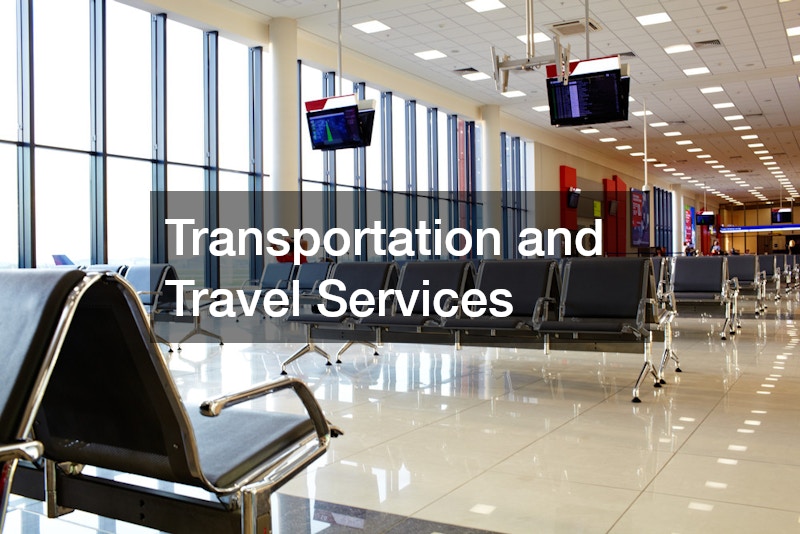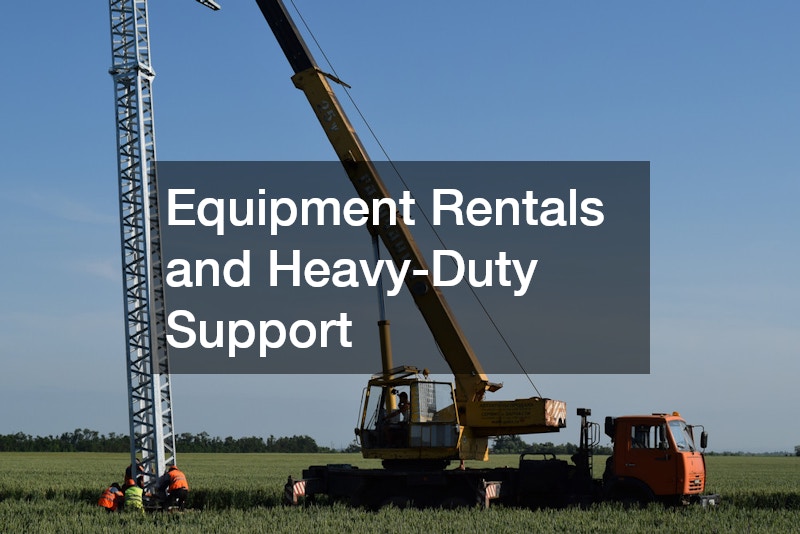When you think about a show production, you likely picture directors, stagehands, lighting techs, costume designers, and actors working together to bring a performance to life. While these core roles are critical, the truth is that a wide array of other businesses play essential—yet often overlooked—roles in making the show run smoothly. Whether you’re planning a theatrical event, concert, touring production, or community play, the behind-the-scenes support can make or break your schedule, budget, and overall success.
The logistics of show production go far beyond the stage. From transportation and safety compliance to medical access, infrastructure development, and unexpected emergencies, the ecosystem of services involved can be surprisingly broad. When time is tight and expectations are high, producers need to rely on trusted partners who understand their role in a dynamic, time-sensitive environment. Many of these businesses operate outside of the traditional entertainment industry, but they’ve become indispensable for productions of all sizes.
This blog explores twelve surprising business types that can be incredibly helpful for your next show production. We’ll examine how each one contributes uniquely to the process, often in ways you might not have previously considered. We’ll also spotlight how these services integrate with the rhythm of a show, particularly when dealing with complex productions involving travel, outdoor performances, or large-scale audiences.
From airports to cutting edge manufacturing, and even a mini highland cow for sale, each of these industries has earned a place in the modern production planner’s toolkit. If you’re a producer, event planner, or stage manager looking to level up your organizational skills and avoid logistical headaches, this list will help you uncover valuable partnerships you didn’t know you needed.
Let’s dive into the 12 businesses that might just be your unsung heroes during your next show.
1. Transportation and Travel Services

One of the most overlooked but essential components of show production is transportation logistics. From flying in talent to shipping sets, costumes, and equipment, you’ll often find yourself coordinating with multiple airports to get the job done. In major cities or international venues, this becomes even more crucial.
Airports don’t just facilitate travel—they often provide direct support for freight handling, customs clearance, and logistical staging for touring productions. If your show is on the move, having connections with airport logistics personnel can reduce delays and ensure smoother coordination. Plus, when weather or scheduling causes last-minute changes, airport support can help reroute cargo or rebook essential crew with efficiency.
As productions expand across borders or involve multiple tour stops, partnering with airport professionals can streamline processes and reduce stress. Whether you’re flying in a choreographer from another state or shipping a set piece overnight, don’t underestimate the critical link between airports and successful show production.
2. Precision Crafting and Customization Needs
If your production requires unique set pieces, props, or advanced stage technology, working with a company specializing in cutting edge manufacturing may be your best bet. These manufacturers offer access to 3D printing, CNC machining, laser cutting, and rapid prototyping—all valuable for creating custom-built set pieces or wearable tech for actors.
For example, if your show includes futuristic scenery or mechanical elements, partnering with a modern fabrication shop can allow you to design and produce these components efficiently. Not only do they deliver speed, but they also bring the precision necessary to meet safety and design requirements in a high-pressure environment.
When your show production calls for innovation, you need a manufacturer who can adapt quickly and work with complex materials. Many of these businesses can also offer sustainable or lightweight alternatives, which is critical for shows that travel or change venues frequently. It’s a partnership that blends creativity with engineering—something most productions can’t afford to overlook.
3. Medical and Rehabilitation Support
While medical emergencies are rare, being prepared is non-negotiable. That’s why collaborating with professionals from occupational therapy schools near me or other local medical programs can offer valuable peace of mind during your show production. These specialists can assist with injury prevention, physical therapy, and ergonomic consultation—particularly for performers or crew members involved in physically demanding roles.
Show weeks can involve repetitive motions, heavy lifting, or intense choreography. This can lead to strained muscles or even more serious injuries. Occupational therapists help ensure that cast and crew maintain mobility and avoid injury over the course of a long production schedule.
Whether you’re hiring someone to be onsite or consulting remotely, this connection can be critical for both safety and performance. It also demonstrates a commitment to wellness that will boost morale and retention. A well-cared-for team is more likely to stay engaged and give their best performance throughout the entire show production process.
4. Memorial Props and Specialty Set Items

In some productions, themes of loss, legacy, or memory play an integral role in storytelling. Whether you’re creating a realistic funeral scene or paying tribute to historical figures, a vendor that provides custom headstones can add a striking layer of authenticity.
Unlike generic props, custom memorial pieces can be designed with precision to align with your vision. This might involve carving names into stone, selecting specific granite colors, or aging materials to reflect different time periods. These pieces can also be reused or preserved as part of an archive or traveling exhibit.
In dramatic productions with serious themes, these props carry symbolic weight. Partnering with a custom provider ensures respectful and visually compelling results. While it may seem unusual, these artisans bring detail and gravity to productions, showing how versatile and unexpected partnerships can enhance the storytelling of any show production.
5. Unique Livestock and Animal Performances
Yes, even a listing for a mini highland cow for sale might become relevant during your show production. Whether you’re staging a pastoral period piece or adding a whimsical twist to a modern play, livestock can play an unforgettable role.
Miniature livestock are especially useful for productions with limited stage space or audiences that include children. These smaller animals are easier to handle, transport, and train, making them ideal for theatrical use. They can also be used in promotional photo shoots or meet-and-greets to build buzz around a show.
However, working with animals in live performance requires extra care, permits, and contingency plans. That’s where a relationship with a reputable breeder or handler becomes essential. With the right support, your four-legged cast member can become one of the stars of your show production, delighting audiences and adding a memorable dimension to your staging.
6. Technology and Audio-Visual Integration
While much of show production focuses on visible stage elements, the behind-the-scenes tech infrastructure is equally important. AV control systems, lighting grids, and digital backdrops all rely on reliable integration—and sometimes, that means bringing in specialized businesses that deal solely with synchronization tech.
Small businesses that work in AV automation or stage control are increasingly being tapped to provide programmable lighting, seamless transitions, or multi-location feeds. For hybrid shows that combine digital and in-person elements, this support becomes essential.
These businesses often go unnoticed, yet their work keeps productions running without a hitch. Whether you’re adapting to a non-traditional venue or integrating complex effects, tech specialists ensure your vision is realized without lag, glitch, or failure. As audience expectations rise, so too must your investment in these modern backstage heroes of show production.
7. Venue Compliance and Real Estate Matters

Securing a venue is often one of the first—and most stressful—steps in putting on a show. That’s where services like landlord representation can offer vital support. These professionals negotiate commercial leases, identify potential conflicts in space usage, and help structure rental agreements that protect your timeline and budget.
Many venues come with complex terms, and a misstep in your lease could cost thousands. Having a legal ally ensures you’re not left footing the bill for structural repairs, insurance issues, or ambiguous clauses. For shows happening in unconventional spaces like warehouses or outdoor plazas, a representative can also secure temporary zoning approvals or occupancy permits.
Whether you’re leasing a black box theater or converting a warehouse into a pop-up stage, landlord reps can make sure the paperwork behind your show production is just as solid as the set you’re building.
8. Structural and Safety Engineering
When it comes to flying in scenery or suspending actors, having access to high-quality rigging equipment is non-negotiable. This equipment allows productions to hoist lights, raise backdrops, or perform aerial stunts safely. Whether rented or purchased, rigging systems must meet precise safety and engineering standards.
Partnering with a vendor who understands theatrical needs ensures you’re not simply borrowing gear used for construction or events—it’s specialized, rated, and tested. Plus, these professionals often provide installation, inspection, and training services to reduce the risk of accidents.
As the scale and ambition of modern performances increase, so does the demand for sophisticated rigging setups. With the right support team, even the most daring moments of your show production can proceed without a hitch—or a hazard.
9. Large-Scale Building Support
Even for a temporary set build, working with general contractors can dramatically speed up the process and improve quality control. Contractors understand timelines, budgets, and permits, and they have access to subcontractors for electrical, HVAC, or custom carpentry needs.
They’re especially helpful when productions involve building semi-permanent structures or transforming unusual locations into performance-ready spaces. Rather than piecing together different tradespeople yourself, you can rely on the contractor to oversee scheduling, compliance, and on-site safety.
For large-scale or outdoor show production needs, a general contractor becomes your behind-the-scenes construction director, making sure everything is up to code and ready for the spotlight.
10. Equipment Rentals and Heavy-Duty Support

When your show production moves into larger venues or outdoor environments, renting construction equipment like lifts, cranes, and generators might be necessary. These tools can assist with setting up stages, installing lights at height, or constructing temporary seating and scaffolding.
Working with a reliable construction rental provider means you’ll get certified equipment that meets safety standards. These companies also offer delivery, training, and pick-up services—saving you time and effort during load-in and strike.
This is especially important when working with limited labor or tight schedules. By partnering with professionals, you avoid delays and ensure the structural side of your production is as polished as your script.
11. Financial Management and Payroll Support
It’s not glamorous, but managing money correctly is essential to a smooth show production. Partnering with a federal credit union can offer advantages like low-interest loans, simplified payroll processing, or temporary credit lines that help you cover upfront costs before ticket sales roll in.
Credit unions are known for their personalized service, which can be a major benefit when managing complex budgets involving travel, rentals, labor, and licensing. They may also offer tools to automate recurring payments to vendors, handle tax withholdings, or manage union dues.
By keeping your financial house in order, you ensure that your show not only opens on time but closes in the black.
12. Honoring Legacies and Memorial Tributes
While it might seem unconventional, custom headstones can play a unique role in certain show productions, especially those that explore themes of remembrance, legacy, or historical storytelling. In theatrical works or multimedia presentations where a realistic set is essential to delivering emotional impact, custom memorials or headstone replicas may be used as stage props or centerpieces to symbolize significant plot points.
For example, historical dramas or biographical shows may need accurate, respectful representations of gravesites or memorials to fully immerse the audience. Working with a business that specializes in custom headstones allows the creative team to develop visually authentic pieces that align with the narrative, whether the goal is realism, symbolism, or emotional resonance.
Beyond stage props, some show production teams also create tribute installations for individuals honored in the show or as part of the production’s broader cultural or community engagement. These may involve showcasing artistic engravings, quotes, or custom stonework to remember a person or event.
Moreover, in immersive or site-specific theater—such as productions staged in historical cemeteries or outdoor venues—actual headstones or realistic stand-ins may be required for authenticity. Partnering with a professional who understands the importance of tasteful design and respectful representation ensures your production is both visually compelling and ethically grounded.
In the evolving landscape of show production, honoring stories with emotional depth sometimes requires tapping into industries like the memorial sector. Custom headstones, though unexpected, can add a powerful touch to your storytelling toolkit.
Behind every curtain call, standing ovation, and emotional climax lies a mountain of coordination that extends far beyond the theatre walls. While your cast and crew are the stars of the show, it’s the lesser-known businesses—airports, cutting edge manufacturing, landlord representation, and even services selling a mini highland cow for sale—that ensure your production is logistically sound, creatively enriched, and legally protected.
The beauty of show production lies in its complexity. It’s an art form that requires creativity, precision, adaptability, and above all, collaboration. By reaching beyond the traditional theatre network and incorporating support from unexpected business sectors, you open up new levels of efficiency and innovation.
From livestock to lighting, legal leases to financial logistics, these 12 surprising business types can take your next show production from good to unforgettable. As productions become more ambitious, inclusive, and immersive, the demand for well-integrated support systems will only grow. A successful show doesn’t happen in a vacuum—it’s the result of countless people, skills, and services working in harmony behind the scenes.
Next time you plan a show, remember: your cast may be center stage, but your success will depend just as much on the businesses standing in the wings.

